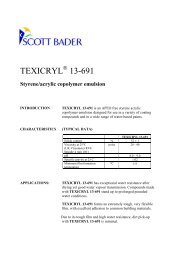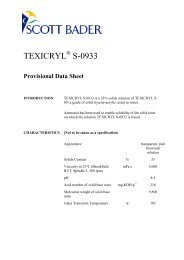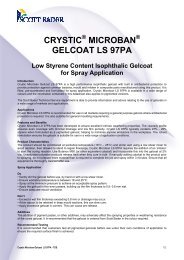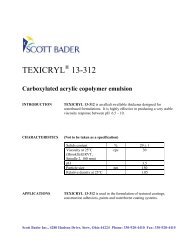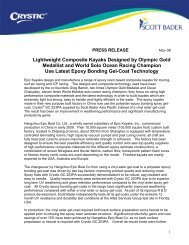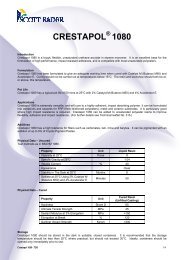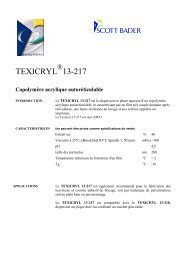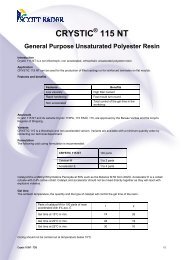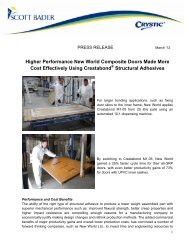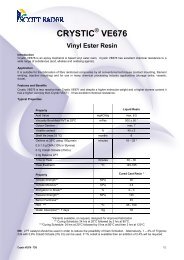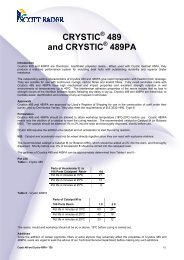Crystic 782 PA Resin - Scott Bader
Crystic 782 PA Resin - Scott Bader
Crystic 782 PA Resin - Scott Bader
Create successful ePaper yourself
Turn your PDF publications into a flip-book with our unique Google optimized e-Paper software.
CRYSTIC ® <strong>782</strong><strong>PA</strong><br />
Heat and Chemical Resistant Polyester <strong>Resin</strong><br />
for <strong>Resin</strong> Transfer Moulding<br />
Introduction<br />
<strong>Crystic</strong> <strong>782</strong><strong>PA</strong> is an orthophthalic polyester resin, designed for use in RTM. A non-accelerated version of this resin is<br />
available, as <strong>Crystic</strong> <strong>782</strong>.<br />
Applications<br />
<strong>Crystic</strong> <strong>782</strong><strong>PA</strong> was developed primarily as an RTM resin, but its properties make it suitable for use in other, similar<br />
techniques. It is recommended for use in applications throughout the chemical processing industry.<br />
Features and Benefits<br />
<strong>Crystic</strong> <strong>782</strong><strong>PA</strong> is a versatile resin, ideally suited to environments where heat and chemical resistance are both required.<br />
Formulation<br />
<strong>Crystic</strong> <strong>782</strong><strong>PA</strong> should be allowed to attain workshop temperature (18°C - 20°C) before use. It requires only the addition<br />
of a catalyst to start the curing reaction. The recommended catalyst is Trigonox 44B (acetyl acetone peroxide). Trigonox<br />
524, an acetyl acetone peroxide/tert-butyl peroxybenzoate mixture developed specifically to obtain more efficient cure in<br />
RTM, can also be used. The amount of catalyst needed will depend on the required geltime, and the temperature of the<br />
workshop and mould, and be approximately determined from the table below.<br />
Pot Life<br />
Temperature (°C)<br />
Pot Life in Minutes Using Trigonox 44B<br />
1.0 1.5 2.0<br />
20 - - 19<br />
25 - - 12<br />
40 5 4 3<br />
50 - - 2<br />
The resin, mould and workshop should all be at, or above, 15°C before curing is carried out.<br />
Additives<br />
The addition of pigment pastes, fillers or other additives can adversely affect the resin transfer moulding process and<br />
properties of the cured laminate. Users should consult <strong>Scott</strong> <strong>Bader</strong>’s Technical Service Department before making any<br />
such additions.<br />
Post Curing<br />
For optimum properties, laminates made using <strong>Crystic</strong> <strong>782</strong><strong>PA</strong> should be post cured before being put into service. The<br />
laminate should be allowed to cure for 24 hours at 20°C, and then be oven cured for a minimum of 3 hours at 80°C<br />
<strong>Crystic</strong> <strong>782</strong><strong>PA</strong> - TDS 1/2
Typical Properties<br />
The following tables give typical properties of <strong>Crystic</strong> <strong>782</strong><strong>PA</strong> when tested in accordance with the appropriate BS or BS<br />
EN ISO test method.<br />
Appearance<br />
Property<br />
Liquid <strong>Resin</strong><br />
Hazy yellow/green<br />
Viscosity at 25°C Poise 3.0<br />
Specific Gravity at 25°C 1.10<br />
Volatile content % 41<br />
Stability at 20°C Months 3<br />
Geltime at 25°C using 2% Trigonox 44B Minutes 12<br />
Property<br />
Fully Cured* <strong>Resin</strong><br />
(Unfilled Casting)<br />
Barcol hardness (Model GYZJ 934-1) 45<br />
Deflection temperature under load† (1.80MPa) °C 125<br />
Water absorption 24hrs at 23°C mg 32<br />
Tensile strength MPa† 50<br />
Tensile modulus MPa† 3584<br />
Elongation at break % 1.5<br />
Specific Gravity at 20°C 1.20<br />
Property<br />
* Curing schedule – 24hrs at 20°C, 3hrs at 80°C<br />
† Curing schedule – 24hrs at 20°C, 5hrs at 80°C, 3hrs at 120°C<br />
Laminate**<br />
Glass content % 26<br />
Tensile strength MPa 67<br />
Tensile modulus MPa 6540<br />
Elongation at break % 1.8<br />
Flexural strength MPa 194<br />
Flexural modulus MPa 7050<br />
** Made with 1 layer Rovicore 600 D3 600<br />
Curing schedule – 24hrs at 20°C, 16hrs at 40°C<br />
Storage<br />
<strong>Crystic</strong> <strong>782</strong><strong>PA</strong> should be stored in the dark in suitable closed containers. It is recommended that the storage temperature<br />
should be less than 20°C where practical, but should not exceed 30°C. Ideally, containers should be opened only<br />
immediately prior to use.<br />
Packaging<br />
<strong>Crystic</strong> <strong>782</strong><strong>PA</strong> is available in 25kg, 200kg and 1 tonne containers. Bulk supplies can be delivered by road tanker.<br />
Health and Safety<br />
Please see separate Material Safety Data Sheet.<br />
Version 2 : February 2013<br />
All information on this data sheet is based on laboratory testing and is not intended for design purposes. <strong>Scott</strong> <strong>Bader</strong> makes no representations or warranties of any<br />
kind concerning this data. Due to variance of storage, handling and application of these materials, <strong>Scott</strong> <strong>Bader</strong> cannot accept liability for results obtained. The<br />
manufacture of materials is the subject of granted patents and patent applications; freedom to operate patented processes is not implied by this publication.<br />
SCOTT BADER COM<strong>PA</strong>NY LIMITED<br />
Wollaston, Wellingborough, Northamptonshire, NN29 7RL<br />
Telephone: +44 (0) 1933 663100<br />
Facsimile: +44 (0) 1933 666623<br />
www.scottbader.com<br />
<strong>Crystic</strong> <strong>782</strong><strong>PA</strong> - TDS 2/2




